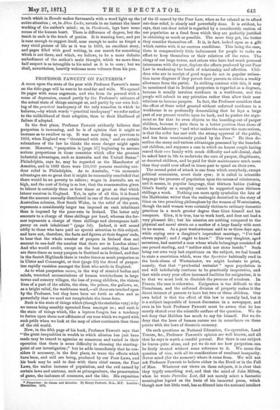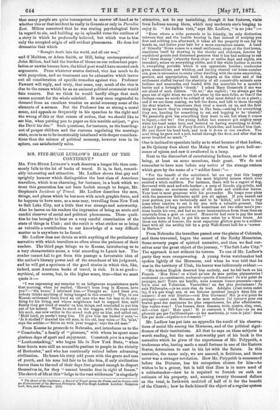PROFESSOR FAWCETT ON PAUPERISM.*
A BOOK upon the state of the poor with Professor Fawcett's name on the title-page will be sure to be read far and wide. We opened its pages with some eagerness, and rise from its perusal with a sense of depression, caused partly by the Professor's estimate of the actual state of things amongst us, and partly by our own feel- ing of the practical inadequacy of the only remedies in which he believes,—by which words "practical inadequacy" we refer rather to the unlikelihood of their adoption, than to their likelihood of failure if adopted.
In the first place, Professor Fawcett evidently believes that pauperism is increasing, and he is of opinion that it might so increase as to swallow us up. It was near doing so previous to 1832, when England was "threatened with ruin," and on certain relaxations of the law he thinks the same danger might again occur. Moreover, "pauperism is [page 57] beginning to assume serious proportions in those countries which offer the greatest industrial advantages, such as Australia and the United States." Philadelphia, says he, may be regarded as the Manchester of America, and in 1869 there were 110,000 persons receiving out- door relief in Philadelphia. As to Australia, "its economic advantages are so great that it might be reasonably concluded that there would be no poverty to relieve ; wages in Australia are so high, and the cost of living is so low, that the remuneration given to labour is certainly three or four times as great as that which labour receives in England. Yet, in spite of all this, it is found that the amount annually distributed in one of the most prosperous Australian colonies, New South Wales, in the relief of the poor, represents a considerably larger tax imposed on each inhabitant than is imposed by the poor-rate in Ireland. The latter only amounts to a charge of three shillings per head, whereas the for- mer represents a charge of three shillings and elevenpence half- penny on each inhabitant" (page 54). Indeed, it will sound oddly to those who have paid no special attention to this subject. and have not, therefore, the facts and figures at their fingers' ends, to hear that the whole number of paupers in Ireland does not amount to one-half the number that there are in London alone ! And Who would credit, except on the best authority, that there are three times as many paupers in Scotland as in Ireland, and that in the Scotch Highlands there is twelve times as much pauperism as in Ulster and Connaught, or that (page 30) the dread of pauper- ism rapidly vanishes amongst the Irish who settle in England.
As to what pauperism means, in the way of stunted bodies and minds, wretched accumulations of human wretchedness in large towns and country villages, the loss of young children, the vicious lives of a part of the adults, the slum, the prison, the gallows, or, as a bright relief, the workhouse ward,—all these are touched upon by the Professor, but they have been set forth so often and so powerfully that we need not recapitulate the items here.
Such is the state of things which (though the statistics vary) is by no means being sensibly uprooted from amongst us ; and such is the state of things which, like a leprous fungus, has a tendency to fasten upon those new offshoots of our race which we regard with such pride when we look at the map of other continents than those of the old world.
Now, in the fifth page of his book, Professor Fawcett says that "the great inequalities in wealth to which allusion has just been made may be traced to agencies so numerous and varied in their operation that there is some difficulty in choosing the starting- point of our investigation ;" but he adds immediately that he con- siders it necessary, in the first place, to trace the effects which have been, and still are being, produced by our Poor Laws, and his book may be said to deal with three chief causes, the Poor Laws, the undue increase of population, and the evil caused by certain laws and customs, such as primogeniture, the preservation of game, the inclosure of commons, and the like. His exposition
• Pauperism: its Causes and Remedies. By Henry Fawcett, MA., MP. London: Macmillan. 1871.
of the ill caused by the Poor Law, when so far relaxed as to afford out-door relief, is clearly and powerfully done. It is evident, he says, that out-door relief is regarded by a considerable section of our population as a fund from which they are perfectly justified in obtaining as much as possible. The more they get, the better they consider themselves off. It is, in fact, looked upon as a gift which carries with it no onerous conditions. This being the case, there is comparatively little inducement for people to make an effort to keep themselves or their relatives off the rates. The clergy of our large towns, and others who have had much personal intercourse with the poor, deplore the effects produced by our Poor Law in weakening the bonds of relationship and affection. Chil- dren who are in receipt of good wages do not in popular estima- tion incur disgrace if they permit their parents to obtain a weekly allowance from the parish. In striking contrast with this, it may be mentioned that in Ireland pauperism is regarded as a disgrace, because it usually involves residence in a workhouse, and the people will submit to any privation rather than allow their near relations to become paupers. In fact, the Professor considers that the effect of State relief granted without enforced residence in a. workhouse is so profoundly demoralizing that he lays a large. part of our present trouble upon its back, and he pushes the argu- ment so far that he even objects to the boarding-out of pauper children, because it puts them in a better position than those of the honest labourer ; "and what makes the matter the more serious, is that the order has met with the strong approval of the public, and has been unanimously praised by the Press." He then de- scribes the many and various advantages possessed by the boarded- out children, and supposes a case in which an honest couple having reared their own family with much difficulty and self-denial, shall be asked later in life to undertake the care of pauper, illegitimate, or deserted children, and be paid for their maintenance much more than they could ever afford in times past to spend on their own.
The second point of attack is one from which everybody, except. political economists, avert their eyes; it is called in scientific language the pressure of population upon the means of subsistence, and it means, in popular language, that thirteen babies (taking Ginx's family as a sample) cannot be supported upon thirteen shillings a week. Nothing can more aptly symbolize the fate of the M.althusian writer than the onslaught described in the story of Gins on two preaching philosophers by the women of Westminster,. though the said women were certainly victims to ordinary domestic practices in a much greater degree than Ginx himself and his compeers. Gina, it is true, has to work hard, and does not lead a. very pleasant life ; but his miseries are nothing compared to the physical and moral strain on a mother of a large family with next. to no means. As a poor washerwoman said to us three days ago, while crying over a daughter's imprudent marriage, "I've had eleven myself ; and I ought to know." This very daughter, aged seventeen, had married a man whose whole belongings consisted of one pound sterling, and "neither stick nor stone beside." Such being our own very last experience on the subject, we feel bound to state a conviction which, were the Spectator habitually read in the back-slums of Westminster, we might hesitate to print,. namely, that that "prudential restraint" upon population is. and will indefinitely continue to be practically inoperative, and that while every year offers increased facilities for emigration, it is. to that we must look to diminish the pressure of numbers. In France, the case is otherwise. Emigration is too difficult to the Frenchman, and the enforced division of property makes it the direct interest of parents to have but two or three children. Our own belief is that the effect of this law is morally bad, but it is a subject impossible of honest discussion in a newspaper, and even in his book Professor Fawcett must be aware that he has. merely skated over the scientific surface of the question. We do. not deny that Malthus has much to say for himself. But we do. deny that the laws of human nature are in accordance on these points with the laws of theoretic economy.
On such questions as National Education, Co-operation, Land Tenure, &c., Professor Fawcett's opinion are well known, and all that he says is worth a careful perusal. But there is one subject he leaves quite alone, and yet we do not see how pauperism can be fairly treated without some reference to it. We mean the question of vice, with all its ramifications of resultant incapacity.. N ever mind (for the moment) where it came from. We will not. ask Professor Fawcett to believe either in the Devil or in the Fall of Man. Whatever our views on these subjects, it is clear that. they typify something real, and that the mind of John Milton, when he wrote Paradise Lost, did not merely select a fantastic meaningless legend as the basis of his immortal poem, which though now but little read, has so filtered into the national intellect that many people are quite incompetent to answer off-hand as to whether this or that incident be really in Genesis or only in Paradise Lost. Milton conceived that he was stating psychological facts in regard to sin, and building up in splendid verse the outlines of a story in which he profoundly believed, but which was to his only the accepted origin of self-evident phenomena. He does but dramatize that which "Brought death into the world, and all our woe," end if Malthus, or Adam Smith, or Mill, being contemporaries of John Milton, had laid the burden of blame on our redundant popu- lation or unwise human laws, the blind poet would have scouted such arguments. From whatever source derived, vice has much to do with pauperism, and no treatment can be exhaustive which leaves ont all consideration of specific remedies against vice. Professor Fawcett will reply, and truly, that some, nay, much of the vice is clue to the causes which he as an eminent political economist would fain remove. But we think he would hardly allege that such causes account for the whole mischief. It may seem ungrateful to demand from an excellent treatise on social economy some of the elements of a sermon. But the Professor has so strong a moral sense, and appeals so frequently in his speeches to the right and the wrong of this or that course of action, that we should like to see him, when putting pen to paper on this terrible subject, "give the Devil his due." Such questions, for instance, as the boarding- out of pauper children and the customs regulating the marriage state, seem tons to be inextricably interlaced with deeper considera- tions than the science of political economy, however true in its 'sphere, can satisfactorily solve.



































 Previous page
Previous page